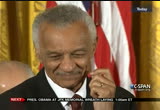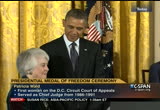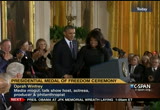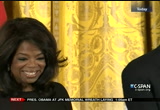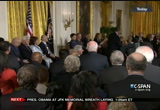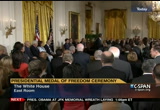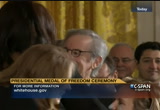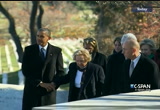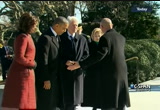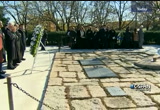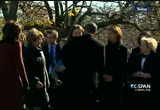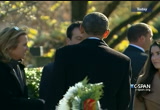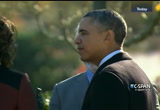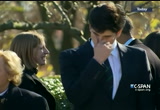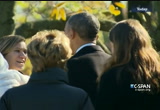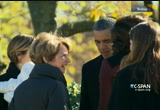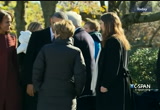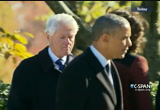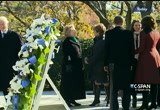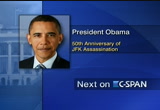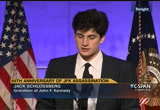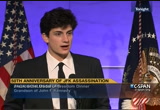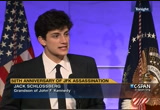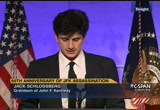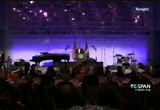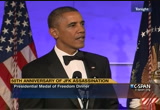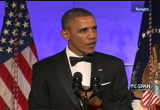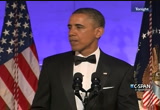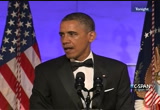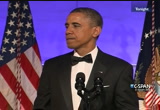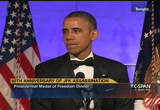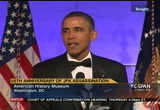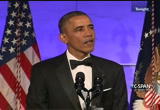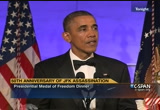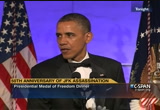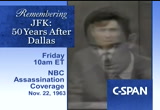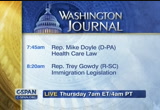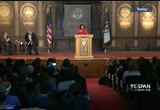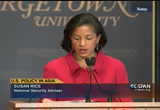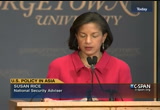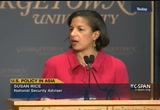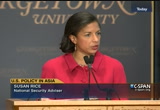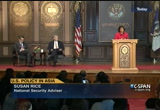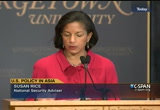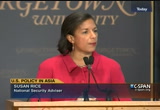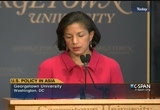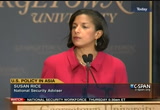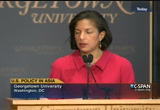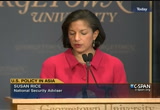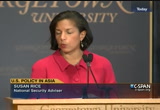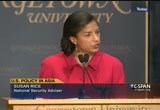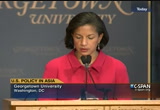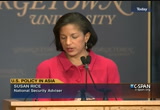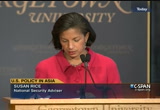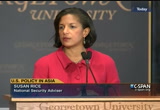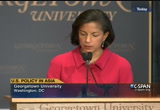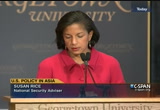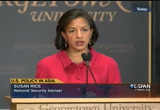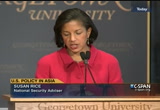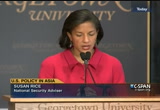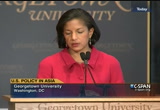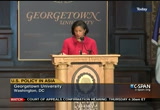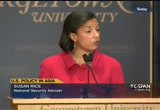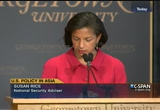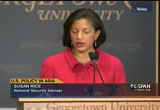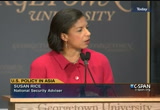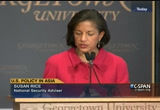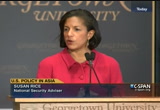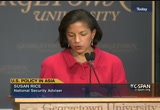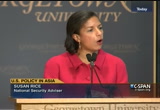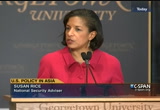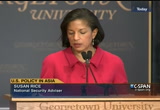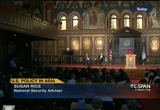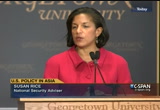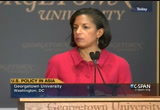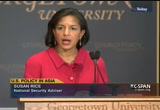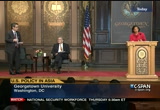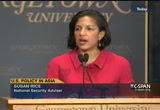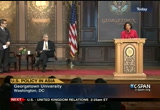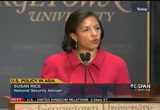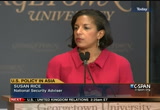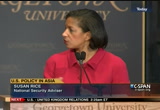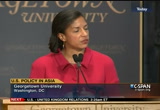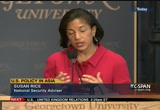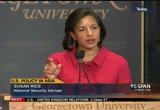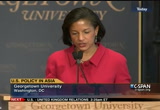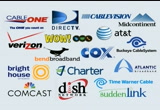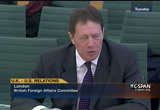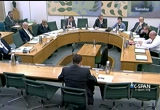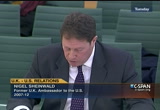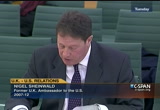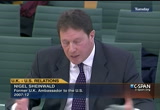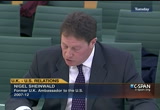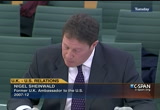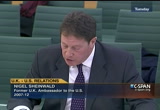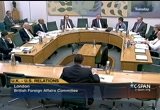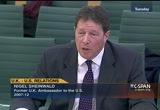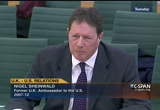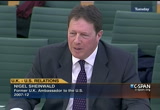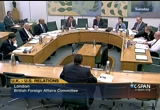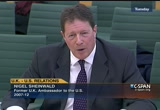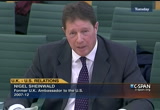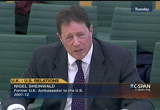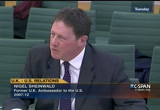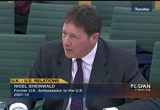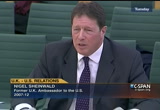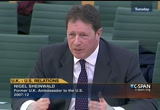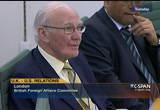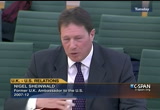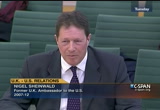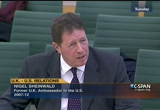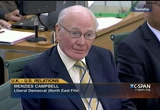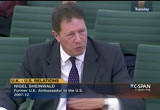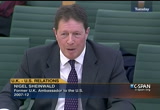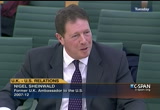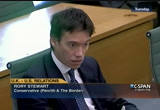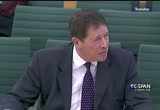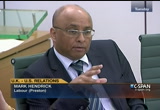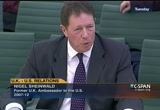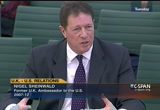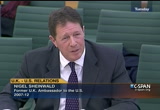tv Key Capitol Hill Hearings CSPAN November 21, 2013 1:00am-3:01am EST
1:00 am
1:01 am
she always strove to better understand the law and fairly apply it. after leaving federal service, judge wald helped institute tandards for justice and the rule of law at the international criminal tribunal. hailed as a model judge, she laid a foundation for countless women within the legal profession and helped unveil the humanity within the law. [applause] opera g winfrey. oprah winfrey is a global media icon.
1:02 am
hen she launched the oprah winfrey show in 1986, there were few women and even fewer women of color with a national platform to discuss the issues and events shaping our time. over the 25 years that followed, oprah winfrey's innateness for tapping into our most fervent hopes and deepest fears drew millions of viewers across every background, making her show the highest rated talk show in television history. oprah winfrey has used her influence to support underserved communities and lift up the lives of young people, especially young women around the world. in her story, we are reminded that no dream can be deferred when we refuse to let life's bstacles keep us down. [applause]
1:03 am
1:04 am
obviously, we are deeply indebted to those who we honor here today. we're going to take some pictures with them and their family members. the rest of you, i understand the food here is pretty good. [laughter] o i hope you enjoy the reception and i hope we carry away from this a reminder of what jfk understood to be the essence of the american spirit, that it is represented here and that some of us may be less talented, but we all had the pportunity to serve and open people's hearts and minds in our maller orbits.
1:05 am
1:06 am
1:18 am
>> president obama spoke about president kennedy's legacy wednesday evening and a dinner honoring the middle of freedom recipients. >> he was introduced by president kennedy's grandson, the son of car line kennedy. his is 15 minutes. >> thank you for that wonderful introduction. i want to thank president obama and mrs. obama for inviting me here tonight.
1:19 am
and for all of you for being here with us. i want to thank my family members who came. it would have been my great uncle robert kennedy's birthday today. and while we are on the subject of birthdays, you are all invited to my 21st. in february 1960 three, my grandfather, president john f. kennedy, formally established the annual presentation of the presidential medal of freedom. honoring persons "who have made exceptionally meritorious contributions to the security and national interests of the united states, to world peace, crotch role, or other significant doublet or private endeavors." my grandfather, a veteran of world war ii, a u.s. congressman and senator and president, use the avenue of public service to make his kind basins to this country, this planet, and all men. he recognized his path was but one of many and that service can and does manifest itself in
1:20 am
different ways. for 50 years, the middle of freedom has been awarded to artists, painters, musicians, composers, dancers whose expressions prompt our own reflections. roles who sees our imagination. two poets and authors whose stories stir our souls and make sense of our struggles. the scientists and explorers who reveal what we do not know and expand what we do. two businessmen and women who commit to the american ideal of innovation and guide through integrity. to educators and historians who help us understand our past for the sake of our future. and to politicians and statesmen, all recipients of this award. this award celebrates the very best of us. the dogged pursuit of truth,
1:21 am
dedication to serve, and boundless capacity to imagine. when president kennedy set the moon as our new frontier, he explained if history could teach us anything, it is that man in his quest for knowledge is determined and cannot be deterred. to those who ask why the moon, why choose this is our goal, he quoted the british explorer george mallory, when asked if he wanted to climb mount everest, he replied simply, "because it is there." well, said president kennedy, space is there and we are going o climate. this award recognizes those who push forward into new frontiers of art, literature, science, diplomacy, and activism because they are there. medal of freedom and knowledge is not just that something admirable has been done but these recipients have committed themselves, their lives, their careers, their creative capacity and passion to all of us. tonight we remember that the 50 years that have passed since
1:22 am
president kennedy formally established this medal, guaranteeing that we honor civilians in this capacity, he displayed his faith that our quest for knowledge and progress would not be deterred. and he reminded us that everyone has the capacity to explore, imagine, and give back to our great nation, no matter the path we choose. when we are told, as my generation often is, of the challenges we face are insurmountable, or that our ability to confront them is not adequate, we must remember a president who not only welcome the challenges of his day but who also saw the wisdom of recognizing the vision and passion wherever they are found. so as our nation welcomes the challenges of our time, thanks to president kennedy and his successors, we may draw upon outstanding samples of wisdom, courage, and creativity, celebrated by this award for half a century to guide us forward. it is now my very, very deep
1:23 am
1:24 am
history, and we are thrilled to be joined by so many people whose accomplishments wrote new chapters in that history. his morning, i recognized 16 brilliant, compassionate, wildly talented people with the presidential medal of freedom, our highest civilian award, and that was intimidating enough. tonight, i am facing dozens of you to the presidential medal of freedom, recipients of this year and years past. it is a great honor to be with you for this anniversary celebration. to wayne, thank you for hosting us. and for all of the smithsonian, with our rich and cultural heritage. and to jack, i am sure the new ambassador of japan will be pleased with how you perform this evening. i will give her a full
1:25 am
report. to all the family members of the kennedy family, we are grateful for your presence and your adoring contributions to the uccess of our country. for centuries, awards have existed for military valor. 0 years ago, president john f. kennedy established a way to award extraordinary civilian virtue, contributions to our country, service to our democracy. dedication to our humanity that has advanced the common interests of freedom loving people both here at home and around the world. since its creation, the presidential medal of freedom has paid tribute to the creativity of writers and artists and entertainers. we have recognized the leadership of elected officials and civil rights organizers, the
1:26 am
imagination of scientists and business leaders, the grit and determination of our astronauts nd athletes. because there is no one way to contribute to the success of america. what makes us great is that we believe in a certain set of values that encourage freedom of expression and aspiration. we celebrate imagination and education, and occasional rebellion. and we refuse to set limits on what we can do or who we can be. other peoples in other times have marked their moments by conquest of war, by dominion over empires. but in the arc of human history, the american experience stands apart because our triumph is not simply found in the exertion of our power. it is found in the example of
1:27 am
our people. our particular genius over 237 years has been something more than the sum of our individual excellence rather a culmination of our common endeavors. it is a truth that resonated with president kennedy when he said, "i am certain after the dust of centuries has passed over our cities, we will be remembered not for our victories or defeats in battle or in public takes but for our contribution to the human spirit." and that unbending belief that the power to make great a nation is found in its people and in their freedom. i was his philosophy. that is his legacy. and it is a legacy told in villages around the world that have clean water or a new
1:28 am
school. and a steady friend in the united states thanks to the volunteers of the peace corps. it is a legacy found in the courage of all who serve under our proud flag, willing like president kennedy himself to pay any price and bear any burden for the success and survival of our liberty. it is a legacy on display in the arts and cultures he and jackie championed as part of our national character. the legacy planted on the moon when he said we would visit it and we did. and the stars beyond. but also in the breakthroughs of generations of scientists that has audacious promise. it is a legacy continued by his brothers and sisters. who have left us a more gentle and compassionate country. jean, a medal of freedom recipient herself, and a
1:29 am
diplomat in every sense, is with us tonight. bobby, whose wife, ethel, is one of my dearest friends. as jack noted, we would be celebrating bobby's 88th irthday today. eunice and pat, devoted advocates for americans of all abilities. and teddy, the youngest brother with the largest heart. he was a happy warrior who never forgot who we were sent here to serve and waged a decade-long battle on behalf of those folks who sent us here, workers rights, immigrants rights, the right to affordable health are. tonight our subsidies are with teddy's wife as she mourns the oss of her father. all told, it is a legacy of service the kennedy family
1:30 am
continues to this day, from caroline who is already drawing crowds of her own as she settles into her role as ambassador in japan, to his great nephew and massachusetts newest congressman, joe kennedy, to the school of public service that bears the public name and teaches young leaders how they may one day pass the torch to a new generation. his is a legacy of a man who could have retreated to a life of luxury and ease, but who chose to live a life in the arena, sailing sometimes against the wind, sometimes with it. that is why 50 years later, john f. kennedy stands for posterity as he did in life -- young and bold, daring. and he stays with us in our imagination not because he left
1:31 am
us too soon, but because he embodied the character of the people he led. resilient, resolute, fearless, and fun-loving, defiant in the face of impossible odds, and determined to make the world a good one, not settling for what is rather what might be. in his idealism, his sober, square jawed idealism, we are reminded that the power to change this country is ours. this afternoon, michelle and i were joined by president clinton and secretary clinton to pay tribute to that proud legacy. we had a chance to lay a wreath at the grave site in arlington, where president kennedy is surrounded by his wife and younger brothers, and where he will rest in peace for all time. remembered not just for his
1:32 am
victories in battle or in politics, but for the words that he ordered all those years ago -- "we will be remembered for contribution to the human spirit." how blessed we are to live in a country where these contributions overflow, in ways both heralded and not so heralded. the thousands of people in san francisco who just helped a little boy recovering from cancer about his superhero dreams. that is part of that spirit. the marines deploying relief after a devastating typhoon, across an ocean. people checking on their neighbors after a tornado. the families across the country who will spend thanks giving day cooking feasts so weathers less fortunate might eat. that is part of the spirit. that is who we are. a people whose greatness comes not by settling for what we can
1:33 am
achieve in our lives, but also because we dare to ask what we can do as citizens to contribute to this grand experiment we call america. and that is what our presidential medal of freedom honorees embody, each and every one of them here today. and those who we remember posthumously. that is the living legacy of the kennedy family. and that is the responsibility we all welcome as americans for our lifetime on this planet. we are extraordinarily blessed to be americans. because we have the opportunity to serve in ways that so many of you have served. because we have the opportunity to touch lives in ways that so many of you have touched lives. god bless you all, and god bless the united states of america.
1:34 am
[applause] captioning by the national captioning institute www.ncicap.org-- >> friday marks 50 years since the assasination of john f. kennedy and we remember the day starting with "washington rarely" and at 10:00 the seen nbc news coverage when they first reported on the assasination and we'll take you live to dallas for a commemorative event.
1:35 am
and to boston from the j.f.k. presidential library and museum for a musical tribute with james taylor and the u.s. naval academy women's glee club performing slecks from the president's state funeral. >> on the next "washington journal" mike doyle discusses the healthcare law and how he thinks it may affect democrats in the next elections. and then the future of immigration legislation and whether congress can come to an agreement on how to move forward. plus your e-mails, phone calls and tweets. "washington journal" is live at 7:00 a.m. eastern on c-span. >> a couple of live events to tell you about tomorrow on our ompanion network c-span.
1:36 am
government surveillance programs. at 2:15 a subcommittee will focus on the political situation in north africa hearing from representatives of the pent fwon nd state department. >> now national security advisor susan rice on u.s. policy in the asia-pacific region. speaking at georgetown university, she also talked about negotiations with iran over its nuclear program. his is 45 minutes. [applause] >> good afternoon, everyone. thank you so much, professor growth. thank you for all of your exceptional work to advance american policy towards asia.
1:37 am
from your time on the nsc staff to your current contributions as director of the asia studies program at the school of foreign service. let me just begin by apologizing a little bit if i sound a little it hoarse. i will do my best to sustain my voice through the course of what is not a short speech, and with luck i will get there. but forgive me in advance. i also want to thank the president and my former colleague, dean caster, for their contributions, along with professor shaw and professor grove, to make it possible for me to speak here today. the most important, for georgetown's unrivaled success in preparing america's future leaders, particularly some any of our policymakers. president obama is deeply
1:38 am
committed to leaving our world more stable, more secure, more free, and more prosperous for the generations to come. those of you who are students here today are uniquely poised to seize the transformative potential of tomorrow across our rapidly changing world. and nowhere are the challenges and the opportunities we face so great as in the asia-pacific region. two years ago, in laying out his vision for america's role in the region, president obama said, and i quote, "asia will largely defined whether the century ahead will be marked by conflict or cooperation, needless suffering or human progress." thus rebalancing towards the asia-pacific remains a
1:39 am
cornerstone of the obama administration's oreign-policy. hotspots r how many emergeelsewhere, we will continue to deepen our enduring commitment to this critical region. our friends in asia deserve and will continue to get our highest level of attention. secretary john kerry has traveled there several times and will return in a few weeks. secretary of commerce and another led important delegations there. vice president biden will visit china, and south korea in early december. although we were all disappointed that the government shutdown compelled president
1:40 am
obama to cancel his trip to asia in october, i am pleased to announce today that president obama will return to asia this coming april to continue strengthening our ties across the region. i would like to take this opportunity to outline what we aim to achieve in the asian pacific in the next three years. ultimately, america's purpose is to establish a more stable security environment in asia and open a transparent economic environment and a liberal, political environment that respects the universal rights and freedoms of all. achieving that future will necessarily be the sustained work of a successive administration. in the near-term, president obama will with the critical
1:41 am
foundations and progress in four key areas -- enhancing security, expanding prosperity, fostering democratic values, and advancing human dignity. let me begin with security. it is the underpinning of all progress in every region. we are making the asia-pacific more secure with american alliances and an american force posture it that is being modernized to meet the challenges of our time. by 2020, 60% of our fleet will be faced in the pacific. our pacific command will gain more of our most cutting-edge capabilities. as we are seeing in the philippines today, a military presence in the region was welcome, not only to deter threats, but also to provide
1:42 am
speedy humanitarian assistance and unmatched disaster response. we are updating and diversifying our security relationships in the region to address emerging challenges as effectively as we deter conventional threats. where urging allies and partners to take greater responsibility for defending our common interests and values. by next year, we will complete the first fundamental revision f -- with japan. japan is creating its first ever security council. i look forward to working with my japanese counterpart regional and global challenges. in south korea, we are enhancing the military capabilities to make sure our combined forces and deter and fully answer north
1:43 am
orea's provocations. with australia, bringing our military's closer by rotating marines through darwin and deepening -- i were doing more with thailand and the philippines to address maritime security and disaster response. -- to do diversify the network, we are strengthening trilateral cooperation. we are urging them to cooperate more closely amongst hemselves. when it comes to china, we seek to operationalize a new model of major power relations. that means managing inevitable competition while forging deeper cooperation on issues where our
1:44 am
interests converge. in asia and beyond, we both seek the denuclearization to the nuclear crisis, a stable and secure afghanistan, and an end to conflict in sudan. here are opportunities to take concerted action in places like sub-saharan africa where sustainable growth would deliver lasting benefit to the peoples of africa, as well as to both of our countries. where are improving the quality of our hairy -- of our military relationship with china. we work on issues like counter piracy and maritime security. good military engagement and
1:45 am
transparency -- greater military engagement and transparency can help with the stress and competition while augmenting high-level communication that has been a hallmark of this administration's approach to china. as we diversify the ways in which we do business with china, we will continue to champion, respect the rule of law, human rights, religious freedom, and democratic principles. these are the common aspirations that all people share. we will do it especially when it is not the easy or expedient thing to do. i sat on the security council of the united nations with china for over four and a half years working on many of these issues.
1:46 am
i know all too well that we have some fundamental differences that cannot be minimized. i also know that our interest on many of the major challenges of our time can and should be more closely aligned. nowhere is this more evident than in confronting the threat that north korea poses to international peace and security. the regime threatens its neighbors. pyongyang proliferates dangerous goods and technology. it seeks to expand its nuclear weapons arsenal and its long-range missile program. it is in flagrant violation of international law. consequently, one of our most pressing security rules is to roll back the threat posed by north korea's nuclear and other wmd programs.
1:47 am
we are prepared for negotiations. they need to be authentic and credible and get at the entirety of north korea's nuclear program. it must result in concrete and irreversible steps forward the nuclearization. pyongyang's attempt to engage in dialogue while keeping critical elements of its weapons programs unning are not acceptable. they will not succeed. we will continue to join with international partners, especially china, to increase pressure on north korea to denuclearize. we will do what is necessary to defend ourselves and our llies. there will continue to be costs
1:48 am
for future provocations. pyongyang has a choice. on one hand lies greater isolation and crippling economic consequences. n the other hand, -- another threat to peace is security and to u.s. interests is maritime disputes in the east and south china seas. we aim to help governments in the region to communicate better with one another so that incidents and see do not -- at sea do not unintentionally spark other complex. we encourage all parties to reject aggression and be in
1:49 am
accordance with international law and norms and establish these full -- peaceful democracies. a good step would be a code of conduct or the south china sea. how the nations and institutions of the asia-pacific manage these disputes will be a harbinger of their ability to shape their hare of security future. indeed, many of asia's most vexing security challenges are transnational security threats. those that transcend borders like climate change, piracy, infectious diseases, transactional crimes, cyber theft, and the modern-day slavery of human trafficking. no one nation can meet these challenges alone.
1:50 am
that is in part why we are increasing our engagement with the regional institutions like the association of southeast asian nation and the east asia summit. these groups allow nations to develop ideas, share best practices, address disputes constructively, and nurture esponsibility. it is essential to delivering more effective solutions than any one nation can muster on its own. these security goals constitute one key element of our asia-pacific strategy, yet we have an equally essential economic agenda in the region. by the end of 2016, we aim to transform our economic relations with the region through
1:51 am
dramatically increased u.s. exports, implementation of the most ambitious american free trade agreement in a decade, and closer cooperation with china, india, and other emerging economies in pursuit of sustained global growth. our own economic future is inextricably linked to that of the asia-pacific. a full quarter of the goods and services exported by the united states are bound for asia. a percentage of our imports come from that region. more than one million americans serve -- we are committed to growing these numbers will making sure
1:52 am
benefits are broadly shared. the united states is working to shape a more dynamic future for the entire region by promoting u.s. businesses and forging new ties of commerce. asian needs open and transparent economies and regional support for international economic norms. if it is to remain a world i'm vegan of economic -- engine economic growth. driving a global economic recovery that creates jobs in the u.s. and addressing the kinds of trade and balance a second tbd to the economic meltdown in the first place will equire hard work on both sides of the pacific -- and balance to the economic meltdown in the
1:53 am
first place will require hard work on both sides of the pacific. for the countries in asia commenting shifting focus from overseas markets to strengthening the domestic sources of demand. and for most economical in the region is concluding negotiations for that ranspacific partnership. the 12 nations a part of the negotiations represent more than 40% of global trade. the rules that we establish through this agreement accepts the standards for future trade greements. this will help level the playing field for everyone. it will promote workers rights
1:54 am
and environmental protections and build a stronger safeguards for intellectual are pretty, improving economic conditions for everyone and not just the few. we welcome any nation that is willing to live up to the high standards of this agreement to join and share the benefits of - that includes china. it can be the core of a far broader agreement expanding to countries across the asia-pacific. to help realize that vision, we are working to negotiate a series of agreements that will put these countries in a better position to join high standard greements.
1:55 am
it represents a $2.5 billion economic block that contains ome of the fastest growing countries in asia, as well as some of its force. helping these dynamic economies improve their policies on key issues like investment principles will benefit them. it will also foster an even greater trade and investment climate and opportunities for the united states in southeast asia. by 2030, india is projected to have the largest population of any country in the world and the third largest economy. during the past decade, the u.s. and india have throughout and valued their global partnership. president obama aims to make the next decade even more ransformative.
1:56 am
from the look east policy to india's contribution to maritime security and it's expanding involvement in regional rganizations, together our nations at launch a new partnership and mobilizing millions of dollars in private or public investment for solar, wind, and alternative projects in india. our governments have joined the private sector earners in both countries to launch a $2 billion nfrastructure debt fund. it is the first of hopefully many future funds meant to attract financing for indian infrastructure projects. we look forward to deepening our cooperations across the broad spectrum of our relationship.
1:57 am
the united states also seeks to elevate our economic relationship with china in the years ahead. last week, china's leaders announced plans for sweeping reform that if realized could go a long way toward leveraging -- leveling the playing field and moving china's economy toward market principles. that is an opportunity we must seize. we will continue insisting on tangible progress in areas that matter to u.s. businesses and workers. these include china continuing to move forward a market determined exchange rate, increasing u.s. access to chinese markets, and bolster protections for u.s. companies
1:58 am
and intellectual property rights and trade secrets, especially against cyber theft. cyber enabled espionage hurts china as well as the united states because american businesses are increasingly concerned about the costs of doing business in china. if meaningful action is not taken now, this behavior will undermine economic relationship that benefits both of our nations. as the world's two largest as the world's two largest energy consumers, energy producers, and greenhouse gas emitters, the united states and china have a duty to lead together to tackle climate change and spurred the global transition to a low carbon energy future. last june, president obama and reached an agreement to reduce
1:59 am
her opponent -- certain potent greenhouse gases. it will scale up successful technologies and policies run heavy-duty vehicles, smart grids, carbon capture, and sequestration. even that asian economies will be the strongest drivers of energy demand in the coming decades, how the region meets its energy needs will have critical implications or global energy supply and climate change. we have a vested interest in shifting the global energy mix to cleaner, low carbon, and more efficient energy technology. as he worked toward this goal in asia, we will partner with regional leaders in renewable
2:00 am
and clean energy technology. m energy and in taiwan and japan and south korea, we are promoting cleaner burning natural gas to meet that energy demand with lower carbon alternatives. another key driver of economic growth and development is the expansion of women's participation in the workforce throughout the asia-pacific. this single change has the potential to do the most a good for the greatest number of people. in developed countries like
2:01 am
japan, full participation in the workforce by women could increase per capita gdp by as much as 4%. it is no coincidence that in the philippines, where there are making strong progress to close the gender gap, it also has an of the fastest-growing economies in the region. the world economic forum has shown that those two factors are closely correlated. simply put, this marler the gender gap, -- the small of the gender gap, the stronger the economic growth. promoting shared prosperity are vital elements. so too is advancing respect for the rights and values we hold dear. since world war ii, the united states has played a key role in
2:02 am
fostering one of the most significant developments of the past century -- that dance of democracy in asia. in the early years, we must help consolidate and expand democracy across asia to enable more people to participate fully in the political life of their country. the rapid change we have seen in the past two years is showing us what is possible. burma used to be a pariah state ruled by military and responsible for egregious violations of human rights. president obama took office and soon she -- hundreds of brumese were put in prisons for merely exercising their right of free speech.
2:03 am
that was until they chose another path. we have worked closely with the government and people of burma as they have made historic changes. more than a thousand political prisoners have and released. we're hoping it will help build an infrastructure head of the 2015 national election. we are supporting a process of constitutional reform and national reconciliation. that's burma moves toward greater openness and change, we are easing sanctions while encouraging responsible investment and robust support for the people and civil society activist who have suffered so long under the iron fist of the dictatorship.
2:04 am
they're still a great deal of work ahead before burma fully transitions to democracy. the challenge of overcoming ethnic tensions and violence in predicting minorities will require persistent vigilance. if progress continues, by the end of president obama second term, we hope to have help firm or reestablish itself as a regional leader and as a thriving if nascent, prospering democracy. the steady work of political reform presses on in nations across the region. united states will support those working to pry open the doors of democracy, even just a little wider from cambodia to fiji.
2:05 am
we will continue to help nations strengthen institutions to uphold justice and the rule of law to meet the basic needs of their people. working with the open government partnership in the community of democracy will help protect civil society and supported to work to shape the region development. we will combat the corruption that makes it so difficult for ordinary citizens running for office start a business or even just send their kids to school. in every region and in every country, we will strive to improve protections for ethnic and religious minorities. we can help nations see the diversity of their peoples as a source of deep strength. fidelity to our values will guide us as we pursue closer
2:06 am
relations with the countries of the asia-pacific, including those with which we differ. we will continue to champion the freedom to speak one's mind and the ability to access information freely and practice one's faith without fear. speak out when governments toss aside basic rights and freedoms which are the birthright of every human being. that brings me to our last set of rules -- helping improve the well-being of the region's most vulnerable people. they should the same desire for dignity as all mankind. we want an asia-pacific and which poverty continues to decline. citizens are healthier.
2:07 am
children are educated. environment is protected. women can participate equally and fully in their societies. we are working in partnership with countries throughout the region to give life to that vision. we now that we can fight and reduce preventable child deaths and approve security across the asia-pacific. we have seen real progress in all of these areas over the last five years. further progress is possible were countries demonstrate the
2:08 am
political will to invest in their own development and step up to do big things together. our feed the future program has helped more than 400,000 rice farmers throughout the region and increasing their yields to the more efficient use of fertilizer. through the partnership for growth, we are working with the philippines to strengthen the country's foundation for economic development while improving their ability to mitigate future disasters. throughout the pacific islands, we are partnering to address challenges ranging from rapid population growth to reducing high poverty and unemployment rates.
2:09 am
we are working with indonesia and others to craft a measurable ambitious development agenda for the world in 2015 and beyond. with smart come a target investments, entries in the asia-pacific are leading dramatic improvements in development. we are collaborating with indonesia to improve health and rural communities. america has a stake in asia. growing up to be productive members of society. earlys why we invest in childhood education and expanding access to post educational training. we are working closely with nations on the school and establishing new programs to of southeast asia
2:10 am
develop new skills and opportunities. equally, we have an economic as well as a moral stake in elevating women as full partners in every aspect of the asia- pacific. we are helping to prevent and respond to violence and combat the scourge of human trafficking. through the equal futures partnership, we are joining with countries across the region, world bank, united nations, and others to advance reforms to promote more opportunities for women to participate in the political and economic life of their countries. and burma, cambodia, thailand, vietnam, where helping women and their countries better manage resources and respond to pandemics and promote educational reform and improve food security. finally, we will do more to help sustainable growth by protecting the environment and conserving
2:11 am
asia's natural resources when implementing measures to help communities adapt to the impact of climate change. we are redoubling efforts to protect wildlife and endangered species. our planet, as we know, is a non-renewable source. it supports some 7 billion people. half of them are in asia and pacific. we have a duty to those who will inherit this earth to put in place practices that will sustain and improve life for future generations. i would like to end today by highlighting a place for all of these elements -- is security, alliances, economic ties,
2:12 am
development, universal values -- has come together in a major manifestation of america's commitment to the region. the philippines is our oldest ally in asia. our nations are forever bound by the blood we shared together, the families we built together, and the history we have made together. last week, a super typhoon slammed into the philippines, leaving thousands dead and millions more in dire need of assistance. as president obama said, when our friends are in trouble, america helps. we are on the ground. pacific command moves into action.
2:13 am
we have put hundreds of marines from oakland now out on the ground almost immediately -- from okinawa out on the ground almost immediately to help with the rescue. water purification capacity and medical services and equipment to clear roads to outlying areas. over the weekend, joining with unicef, we were able to help the philippine government bring water purification and production systems back online. it is now providing clean drinking water to thousands of people. we are cooperating seamlessly with allies in the region, particularly japan and us chile who have stepped up to help a neighbor in need -- japan and australia who have stepped up to help a neighbor in need.
2:14 am
recovery will be a long process. the united states will stand beside the philippines every step of the way. getting back to work and rebuilding homes and schools. our pledge to the philippines reflects our broader pledge to people of that asia-pacific. america's commitment will not expire a few months or a few years from now. the united states will be there reliable, constant, strong, and study for the long haul. we will continue to share security and prosperity and human dignity that we all cherish.
2:15 am
2:16 am
apologize to the audience. given the time constraint, we have collected questions in advance. the first question comes from drew. a first-year master student in the program. his question is on china and japan. he asked -- decides adopting a policy, is there anything else the u.s. can do in regards to the island disputes between china and japan? to what extent can we serve as mediator on this issue? >> that is a very important question. indeed we are very focused on the dispute over the islands. the u.s. does not take a position on the question of sovereignty, for the fact of the matter is we have a stake in avoiding conflict and helping
2:17 am
china and japan ovoid any escalations and to find peaceful, diplomatic ways to address their disputes. we are encouraging that two sites do have open channels that will enable them to avoid the risk of unintended escalations in the event of a misunderstanding or miscommunication. we are encouraging them to work on this issue with an understanding of the risk involved and the necessity of avoiding any kind of conflict that would be disastrous are only for those countries, but the broader region and the economy. >> the second question is on korea. this comes from sam who is a senior. he asked -- what steps, if any, can administration take in the remaining years of president obama second term to restart the six party talks? how do you think negotiations with iran would impact the north korean issue? >> let me start with iran and come back to north korea. we do not know yet. we will learn in the next two days how the current round of talks between the p5 plus 1 are negotiating with iran.
2:18 am
the last round yield a significant progress, but not a resolution. the p5 plus 1 remains united. on the table is what we consider to be a reasonable and well crafted first step initiative. that first step would be for a six-month period to buy time and space for comprehensive negotiation that could resolve iran's nuclear problem. the reason to buy that time and space is because without this interim agreement, there would be no rate on iran -- no break on iran continuing with its nuclear program while it talks and perhaps drags out talks. this interim step would halt all progress in iran's nuclear row
2:19 am
graham and roll back its program in some key respects. centrifuges, enrichment, and it would give the international community unprecedented transparency into all aspects of the iranian new their program. now, whether it comes to pass remains to be seen. that would be a good first step for the united states because it would enable us to test the prospects of a peaceful solution. at the same time, it would give international community greater insight into the nature of this program while altering its progress in rolling it back. what important lessons does that have for north korea?
2:20 am
if that agreement is reached, it would have been a product in large part because of the concerted pressure that the members of the international community had applied. it will be the product of efforts over the years between the united states, france, britain, russia, china, and germany. the fact that the p5 plus 1 have hung together, it might have created an opening. in the case of north korea, we have had similar unity and economic pressure. china and the united states have stepped up increasing the pressure on north korea. north korea has not made a decision.
2:21 am
2:22 am
we remain open to the resumption of negotiations. we are open and have bilateral channels for communication with north korea, but north korea has to make the fundamental choice that it is serious about denuclearization. the five countries in the six parties, the members of the security council have been very clear about what is necessary. >> the last question is from a first-year masters student.
2:23 am
i am very interested to know what dr. rice's take on the newly established chinese state security committee. suppose this committee had the primary mission. what would she say to him or her? [laughter] >> i think we need to wait and see exactly the nature of the responsibility this new security council will have. the nature of its leadership. it is an interesting potential development and if i have a formal chinese counterpart, i will look forward to working with him. i suspect maybe not a her. to work on that pantheon of issues that we deal with every day in china. in the absence of that
2:24 am
structure, we still have very regular and open channels with chinese counterparts. with many of those closest to the leadership who work on core national security. it would be nice if there was a structure that would accelerate and coordinate chinese foreign policy and national decision- making and facilitate the kind of collaboration that we enjoy in here, most days, in the united states. thank you very much. [applause]
2:25 am
>> if i could ask you all to stay in your seats so ambassador rice can leave the building, that would be helpful. thank you. [captions copyright national cable satellite corp. 2013] [captioning performed by national captioning institute] we bring public affairs events from washington and directly to you. we bring you briefings and conferences. we offer complete gavel to gavel coverage of the u.s. house as a public service of private industry. we are c-span. we were created by the cable industry and are funded by your local cable or satellite divider. now, you can watch is in hd.
2:26 am
now, a discussion about the u.s. and the united kingdom. the former british ambassador to the united states spoke before the british foreign affairs committee for little more than an hour. >> our second witness today he was the good to see you here again. is there anything you would like to say in the way of opening remarks? >> thank you for the opportunity to contribute. i would like to make some introductory remarks. that theng point is
2:27 am
relationship remains the most important of the uk's international relationships. it is remarkable that despite the many cultural and other differences between us, we still have a shared approach to the world. fears ofvercome the decoupling europe and america which were prevalent during the cold war period. relationship is a close set of defense and nuclear intelligence connections. all of that rests on foundations which are largely nongovernmental. the human links, the vibrant
2:28 am
cultural and educational connections and a remarkably successful commercial and economic relationship. it was very good that you delve into that just now. i do not think the fundamentals changed since the coalition government took power in 2010. the prime minister has been genuinely committed. there has been some change in the rhetoric, the objectives stated by the government. it is language designed for british, not for an american audience and it does not completely convey the extent of the relationship to between us. the government has stressed what the relationship for the british national interest.
2:29 am
this is understandable and necessary in reaction to public concerns in the u.k. after iraq. obama administration has -- the usemade clear of the term essential relationship when president obama visited the u.k. was intended to underscore the relevant and operational value of the contemporary relationship and to show that neither side was simply relying on history and sentiment. after five years, it it is a cardinal feature of the president's foreign-policy that one of america's strength is its ability to attract and maintain strong allies. they put more emphasis on it
2:30 am
now. europe is no longer the principal object of the american foreign-policy. instead, our value is as partners in dealing with the world political and security problems. special relationships are formed out of the daily transactions of mutual benefit. the china-u.s. relationship is probably the most important for the two sides. the u.s. needs allies in this world and the u.k. is still the closest and most globally capable ally that the united states has. it does not diminish key relationships. the u.s. government supported the u.s. give it toward the asia-pacific -- the u.k.
2:31 am
government supported the pivot toward the asia-pacific region two years ago. we have our own british pivots to the east and the south reflecting a shift in economic power. that is right for america and it is right for the u.k., but some clarity is needed. the u.s. will remain a global power with enduring interest in the middle east. that was not properly understood at the time. on the u.k. side, we need to work out how are asia-pacific is overwhelmingly commercial or whether there are political security and economic policy elements to it as well. the u.s. would welcome europeans working with them
2:32 am
i believe the u.k. will be a more attractive and influential partner around the world with emerging powers if it is seen to have a strong relationship with the united states. i believe the foundation that the u.k.-u.s. relationship remains strong. both the u.k. and the u.s. are both suffering from a sense of fatigue and caution after iraq and afghanistan. the ground interventions are out of the questions for the foreseeable future. the linear experience shows us the limits of winning wars from -- the libya experience shows us the limits of winning wars from the air.
2:33 am
we do need to construct some new models of intelligence involvement and should aim to do this collaboratively with the united states and france. the u.s. administration worries about the debates on identity, which we are having here in the u.k. their interest is in an active international, economically liberal u.k., which is influencing the european union from the inside. watching the be referendum campaign. defense cuts in the next parliament could weaken the u.k.-u.s. relationship. the u.s. defense budget is also under pressure. some concerns, the
2:34 am
administration basically accepted the british government line on our strategic defense and security review in 2010 and accepted our assurances that we will remain it. from power. a power.ld remain whether we have an navy, which carries -- which contribute to the broader assets to the asia- pacific is also a question. thank you, chairman. >> that was helpful and interesting. during your time as the a change ofwe had administration. did you see any difference in
2:35 am
the approach of the government? did it result in the change of policy? >> no fundamental changes in policy. broad continuity of objectives going from the blair administration to the brown administration. there was a change in the public language used to some degree. that language has continued in government. i do not think it has affected the fundamentals and anyway. in the gordon brown period, primee of world events, minister brown would have located our work together on his national economic issues as very
2:36 am
central. that is more difficult to see over a period of time. we come back to the core strategic foreign-policy. >> the responsibility of nato europe. the minister of did that come across anyone's radar? >> i do not think it had any significance. period, the main activity was afghanistan. it was really through that prism that we viewed it. government,esident there is a deputy prime minister. seen as arson seen
2:37 am
vice president? >> it is useful because it does provide a neck strap area -- it does provide an extra point of contact. vice president biden plays a full role in the u.s. foreign policymaking process. he had decades of experience in international affairs. it is useful for us that there is regular contact between our deputy prime minister and him. , it it isnquiries important there are many other relationships as well, the u.s. is a presidential system. in this obama administration, you could argue that there is even more of the key decisions happen pulled into the white
2:38 am
house done before. thanan before full -- before. key fore house remains any foreign-policy. that has been an important element. i would never dismiss it. it needs to be kept in perspective. the british media sometimes focuses only on the relationships at the top. >> thank you. >> if you were back at your post in washington, what would you be saying to the british government? are the top priorities for the u.s.- in ensuring u.k. relationship remains strong
2:39 am
and beneficial to both countries? >> i hinted at some of those points. this is not any particular order. there are four or five key points. active inis to remain the european union. the americans want us to be active for a range of financial and foreign-policy reasons. decisions that may be coming to the u.k. over the next two years, that is the most significant -- over the next few years, that is the most significant. defensemaintaining our and diplomacy budget, they will both be important in the five to 10 years i had.
2:40 am
it will be significant -- 10 years ahead. it will be significant. the americans will be looking at a range of decisions and will judge whether we have the appetite, the political will to remain active. are a number of decisions about our defense budget which are coming up on which will be debated in the united states, depending on which way we go. i think our ability to influence the united states depends on having assets and expertise available and on the table. that means retaining our expertise. that will continue to be the asia-pacific region. we need to resolve for ourselves whether we complaint a broader
2:41 am
role in the asia-pacific -- we can play a broader role in the asia-pacific. are we going to extend our broader foreign-policy? are we going to maintain our expertise in different parts of the middle east jigsaw? these are the areas where we could exercise influence when we have something additional to put and cause the administration to rethink its policies. that requires maintaining our diplomatic network. that is a range of the things i going from the strategic to the more day-to-day issues of our assets around the world.
2:42 am
one of the changes with the coalition government was the national security council and the national security advisor. facilitated,sted, influenced the u.s. administration in a way that was not the case before? helpful development. it was an evolution. thing in theme previous few years with a growing role. there is a difference. having a single national security advisor who brings together foreign and defense
2:43 am
roleshe national security , does make a difference. i think it looks like a more coherent structure. i think to the extent it gives our national security advisor additional responsibilities is helpful in his relationship with the united states. >> when you were the ambassador in washington, how did you interact with the national security advisor compared to how you interacted with the secretary? >> in the u.k.? >> yes. >> any ambassador reports formally to the foreign secretary. if you were about to have a visit by the prime minister, you might direct your tactical
2:44 am
advice on handling of visit by the prime minister primarily to the national security advisor. secretary is in a different league from the national security advisor. he is the member of cabinet responsible for foreign affairs. that is different from the role of senior official. >> was the reverend occasion where having the two -- was there ever an occasion where having the two cost difficulty? -- caused difficulty? not in my experience. less pronounced in the british system.
2:45 am
i have not detected that over the period of the last few years. >> in the last parliament, the foreign affairs committee published a report. there was a lack of a dedicated ministerial focus within the foreign office team on the united states relationship. the minister of state had other responsibilities. is there -- is that a problem? >> the honest answer is no. the key thing is both the prime minister and the foreign secretary, they devote a significant chunk of their time to thinking about the u.k.-u.s. relationship. i do not think it can be done at those levels effectively because
2:46 am
the minister does not have an obvious counterpart. if the assistant secretary of state to europe or you could say it is the secretary of state to the americans. .t really would not work the prime minister and the foreign secretary are the two with the relationships. they have to bear the burden in making sure the relationship is in good shape. does notited kingdom make a strategic approach to its relations with the united states. that is married to some criticism. the -- your response to
2:47 am
do we take a strategic approach? how would you assess performance of the strategy? it was created on your watch. >> thank you. first of all, this is a difficult issue because the u.k.-u.s. relationship is a huge relationship. it is very difficult to easily summarize it. it covers most elements of the foreign office. it covers significant chunks in the rest of government. it is quite difficult to capture it. governments have tried to think about the relationship as a whole and it tried, if you are
2:48 am
looking at the middle east or the asia-pacific, have looked at the u.k.-u.s. role going forward. i think it is fair to say that in the last couple of years, the increased volatility in the world and the pace of events over matching our ability to think forward rationally has been a factor and most foreign ministers around the world would find themselves doing more firefighting than long-term strategic planning. you are right. the strategy board was announced visit president obama's in the spring of 2011. it was an american proposal. it was to give expression to the fact that we were already doing
2:49 am
a great deal of foreign-policy coronation, discussion -- coordination, discussion in any event. i do not know -- it has been a couple of years now since i was in washington. i do not think the government at the time said this is the be-all and end-all. it was a useful addition to what we had rather than something that was fundamentally different. i think it is useful, but not absolutely essential to the overall relationship. problems ofome coordination on the american side, just getting the team , which hampered its first few months.
2:50 am
not think this is critical to the issue of thinking forward. the prime minister and the president have relatively little time together. you have a sort of overview of the overall relationship. nextat takes me on to my point. a mistakeyou make in this country as american for a policy -- foreign policy being monolithic. you have the state department, you have the senate, you have nsc, and, you have the you have the pentagon.
2:51 am
do you think we have difficulty here formulating policy when there are so many separate sources of policy on the other side of the atlantic? >> it is something we have to bear in mind the whole time. the administration -- it takes a its time to coordinate to then where i can say congress or allies, this is where we are. we have to bear that in mind. , whetherolutely right it is in london or washington, you have to cover all those bases. it is all part of these -- this backwards and forwards. from this more close environment in which the
2:52 am
ministers operate in the u.k. to, point -- two, a point, when the view, thatame to a would carry the day. we are in a different world today. ambassador inre washington, how did you cope with the fact that you were -- how was it possible to do that? >> the embassy has got to be equipped to do that. there is a lot of direct
2:53 am
contact with london. there is traffic in all directions. to coverto be staffed the waterfront in washington. officerhanistan desk needs to be just as active on nsc as with in the the day-to-day contacts in the state department. i was in washington anymore junior role in the 19 -- i was in washington in a more junior role in the 1980s. i will take an example of the iran sanctions. a couple of years ago, there was another round of sanctions and debated in the u.s. congress. one touched on the interest of
2:54 am
bp. we had to lobby very hard to make sure that did not happen. there was a cast that agreement, but we had to do it ourselves and with our european partners on the hell. -- european partners on the hill. >> it looks as though the nsc is behind the curve. theere a bit slow to detect change in policy toward iran. is there something we could do -- change the daily
2:55 am
activities? >> i am not sure whether your examples are right. point is tokey ensure you have reasonable -- that goes without saying. if you do, to make sure people in the embassy are as open as they can be to a very wide range of people. you were one of those who had a insightd occasional into american policy as it was evolving. others in the embassy kept in very close touch with you.
2:56 am
we will have a take on the way american policy is developing. if more of that needs to be done, that is something to think about. suggestionck to your about resources. earlier theoned change in terminology from a pivot to a rebalancing. u.s. strategic landing was important in the past. fact theess, given the , the communistr .ountries are gone
2:57 am
attention is turning away from europe because of the geopolitical developments taking place because of the rise of china and everything else that is happening. the u.k. is far less important to the u.s. think the pivot had very much to do with europe. i think it was conceived strategically as a signal that the united states is going to get out of two very difficult and aa preoccupation military intervention in afghanistan and iraq, and wanted the next decade to be about
2:58 am
launching a new type of partnership with a range of emerging countries around the world. it was an area of obvious economic growth. that is what it was about. the fact was that a number of european who felt they were a bit slighted by the pivot did make their views known. the administration realized they had not said enough about this worldview and that came through in a number of subsequent statements. the 1990s,t -- since the balkans or the last time the united states were really focused on europe as a geopolitical object in its own
2:59 am
right. since the 1990s, the key thing for america as they look to europe is whether we are participating with them in world affairs. whether the europeans were doing enough as a whole to support the nato efforts in afghanistan. active andwere responsible partners on issues like iran. yes, we have been, and increasingly so. at,s that they are looking whether europe is an effective global partner for america. i do not think it was about europe.
3:00 am
-- was you interpret there some other factor involved? >> i do not think it was the , a completely single model. in the case of libya and syria, the truth was the british prime minister and the french government and maybe a few others were more in favor of action than the united states were. i do not think we would've had the nato operation in libya without the prime minister
81 Views
IN COLLECTIONS
CSPAN Television Archive
Television Archive  Television Archive News Search Service
Television Archive News Search Service  The Chin Grimes TV News Archive
The Chin Grimes TV News Archive 
Uploaded by TV Archive on

 Live Music Archive
Live Music Archive Librivox Free Audio
Librivox Free Audio Metropolitan Museum
Metropolitan Museum Cleveland Museum of Art
Cleveland Museum of Art Internet Arcade
Internet Arcade Console Living Room
Console Living Room Books to Borrow
Books to Borrow Open Library
Open Library TV News
TV News Understanding 9/11
Understanding 9/11